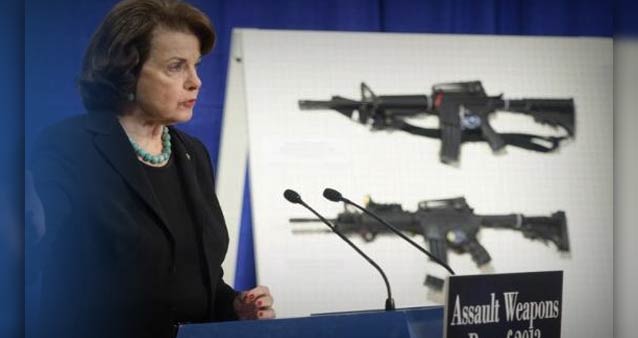
Sen. Dianne Feinstein (D-Calif.) said on Monday that a controversial assault weapons ban will not be part of a Democratic gun bill that was expected to reach the Senate floor next month.
After a meeting with Senate Majority Leader Harry Reid (D-Nev.) on Monday, a frustrated Feinstein said she learned that the bill she sponsored — which bans 157 different models of assault weapons and high-capacity ammunition magazines — wouldn’t be part of a Democratic gun bill to be offered on the Senate floor. Instead, it can be offered as an amendment. But its exclusion from the package makes what was already an uphill battle an almost certain defeat.
The ban is supported by more than a dozen Senate Democrats and the White House, as well as gun-control groups.
“My understanding is it will not be [part of the base bill],” Feinstein said. “It will be separate.”
Asked if she were concerned about the decision, Feinstein paused and said, “Sure. I would like to [see the bill moved], but the leader has decided not to do it.”
“You will have to ask him [Reid],” she said, when asked why the decision was made.
Reid’s decision highlights the tightrope walked by the majority leader in governing the gun control issue. Trapped between the White House and rank-and-file Democrats who support broad gun control legislation following the shootings last December in Newtown, Conn., Reid must also be mindful of red-state Democrats up for reelection in 2014 who favor gun rights.
And the decision to drop the assault weapons ban from the package illustrates the fact that any big changes to gun control legislation will still be challenging.
Aside from the ban, three other major pieces of gun legislation have been approved by the Senate Judiciary Committee: a gun trafficking bill, a Democrats-only background checks measure and a proposal to increase school safety.
Top Democratic aides said Reid — who is huddling this week with Judiciary Committee Chairman Patrick Leahy (D-Vt.) — who will manage the gun bill on the floor — may file the Democratic gun bill as early as this week, as he prepares to bring the measure up for a vote in early April after a two-week congressional recess.
The contents of the Democratic gun package — as well as the amendments that will be allowed on the floor — are the subject of intense maneuvering on and off Capitol Hill.
There are two likely paths: Reid could advance a gun trafficking bill with a school safety provision; some form of background checks and the assault weapons ban would then be offered as amendments. In the other scenario, Reid might offer a background checks bill that includes the gun trafficking and school safety provisions, with assault weapons again offered as an amendment.
The Judiciary panel also approved a bipartisan gun trafficking bill backed by Leahy, Sens. Chuck Grassley (R-Iowa), Kirsten Gillibrand (D-N.Y.), Dick Durbin (D-Ill.) and Mark Kirk (R-Ill.), among others, that dramatically boosts penalties for “straw purchases”of weapons, in which a person buys firearms on behalf of an individual barred by law from possessing them. Thanks to its support from Republicans, Reid and Leahy want to see this bill as a foundation for the Democratic gun package on the floor.
But Sens. Chuck Schumer (D-N.Y.) and Joe Manchin (D-W.Va.) are continuing to seek conservative GOP partners for their universal background checks bill. The two Democrats negotiated with Sen. Tom Coburn (R-Okla.) on the issue for weeks, but in the end that deal fell apart. Schumer and Manchin are meeting with other Republicans to seek their backing, yet they have not been able to find a partner. Kirk, a moderate, is likely to be part of whatever legislation Schumer and Manchin introduce.
A universal background checks bill with no exemptions was offered by Schumer in the Judiciary Committee and approved by the panel with only Democratic support. But it will not be part of the basic bill that comes to the floor, Democratic insiders said.
Pro-gun control groups want a revised Schumer-Manchin background checks proposal — which is slightly less stringent than the bill offered by Schumer in the Judiciary Committee — in the Democratic bill and are lobbying the leadership to include one, said Senate sources.
There are additional versions of background checks bills being floated — and Manchin may soon introduce a version based on the talks with Coburn — but which one will get Reid’s blessing is up in the air.
“We expect that background checks will be part of the base bill,” said Mark Glaze, director of New York Mayor Michael Bloomberg’s Mayors Against Illegal Guns.
But Glaze — along with others advocating universal background checks — said he is not sure which version of the background checks bill would be included in legislation Leahy and Reid send to the Senate floor.
However, it’s clear that the senators involved in the gun control debate would like to have something introduced by the end of this week to sell to constituents at home during the upcoming recess.
Republicans, for their part, strongly oppose any gun-related provisions beyond the gun-trafficking measure, meaning Reid and other top Democrats have to determine which provisions can reach the 60-vote threshold to overcome an expected GOP filibuster.
Sen. John Cornyn (R-Texas), the chamber’s minority whip, has pushed for greater scrutiny for gun purchases by the mentally ill, but adamantly opposes any of the Democratic proposals on assault weapons, high-capacity magazines or expanded background checks.
“To truly address gun violence, and do so with broad bipartisan support, we should be addressing the serious deficiencies in our mental health system, improving our background check database and rigorously enforcing existing laws,” Cornyn said after the committee markup.
A proposal barring gun purchases or possession by the mentally ill was introduced recently by Sens. Lindsey Graham (R-S.C.), Jeff Flake (R-Ariz.), Mark Begich (D-Alaska) and Mark Pryor (D-Ark.). Graham, Begich and Pryor are up for reelection in 2014.
“I believe that the best way to interrupt the shooter is to have a mental health system that actually records and enters into the database people who should not be able to buy a gun,” Graham said of the proposal.
This article was originally posted by: John Bresnahan and Manu Raju – Reid Epstein contributed to this report.


